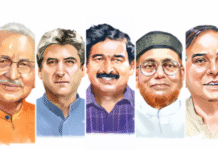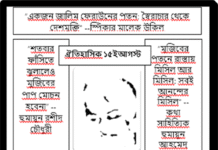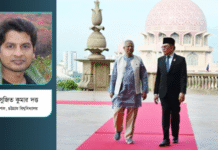INDIA’S high-handedness to its neighbours, especially Bangladesh, is conspicuously evident in that the issue of border control regime, marked by New Delhi’s rhetoric of asking its border guards not to use lethal weapons yet the Border Security Force’s shooting unarmed Bangladeshi civilians, picking them up from the frontiers and even intruding, sometimes aiding Indian civilians to cross into, the Bangladesh territory to rob people and harvest crops. The issue, among many others that are pressing, has remained unresolved for years. Dhaka and rights organisations and saner sections of citizens of both Bangladesh and India have time and again made big noise about the issue, yet nothing has visibly changed. India’s attitude, in many affairs, especially including border control management, has, thus, remained unfriendly. New Delhi also appears to have resolved to keep the case of the murder of Felani Khatun, a 15-year-old girl who was shot dead by India’s border guards in the Kurigram frontiers on January 7, 2011 and was hung from the barbed-wire border fences, unresolved. The Indian border guard suspected of committing the murder was identified and the case could roll into trial but India’s general security forces court in Cooch Behar in 2015 found the suspect, surprisingly, not guilty.
After the heart-rending photograph of the girl, killed and hung upside down from the border fence on the Indian territory, had created a huge furore in Bangladesh, and also in India to some extent, it made an international outcry. Yet still, Felani’s family cries for justice seven years after the incident. Her father, as New Age reported on Sunday, feels that the trial process was disappointing. This brings to the fore the intention of the Indian authorities to let the issue go down in history without having to do anything, as much as its unwillingness to impress on its border guards that there is no chivalry in shooting people who have no firearms. Felani’s father saying that none from the government of Bangladesh has contacted him on the issue also speaks of a lack of seriousness and subservient attitude of the government, more in the case at hand, and less of successive governments, in other such cases of border death, torture and intrusion into the Bangladesh territory by the Indian guards. Rights organisation Odhikar in Bangladesh says that 403 unarmed civilians had been killed by the Indian guards from 2009 to 2017 — 269 shot dead, 109 tortured to death and 25 killed by other means. Moreover, Indian border guards wounded 593 Bangladeshis and abducted 468 others in the period.
Justice in the Felani case could be the departure point for justice in all other such cases. While Dhaka must, therefore, seriously, and earnestly, take up the issue at hand and others with Delhi, conscious section of citizens of both Bangladesh and India must keep making noise, nationally and internationally, to resolve the issue of border death that has for years been taking place apace. But Dhaka must slough off its subservience first to get the issue going.
Source: New Age.









